Struggling to choose the right type of towel for your needs?
Choosing the right towel goes beyond softness and color. It’s about performance, comfort, and long-term value. Cotton and microfiber are the two most popular options. Each option has its distinct advantages that suit different needs. Cotton offers natural softness and durability. Microfiber delivers lightweight efficiency and quick drying.
In this article, we lay out the details of microfiber and cotton towels. Continue reading to learn about their characteristics, applications, advantages, and drawbacks.
Let’s get started!!
Characteristics of Cotton Towels
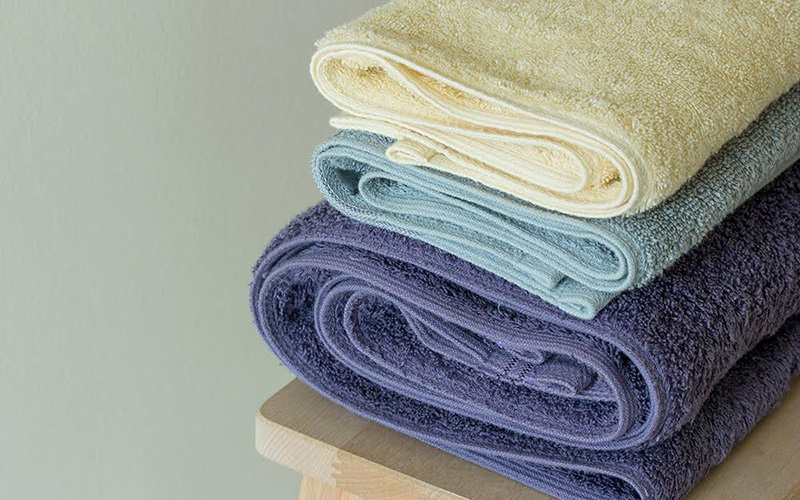
Cotton towels are the go-to cleaning product for home and professional applications. Manufacturers weave towels from all-natural cotton yarn. Protruding loops are added on the surface to increase water absorption. The final look and feel of the towel is dependent on the weaving technique.
The protruding yarn ends are called terry loops and increase the surface area of the towel. More surface area means more points of entry for the water.
If you look closely at a cotton cloth, you will see tiny fibers of cotton (fuzz) sticking out. These hair-like strands create several small air pockets in the fabric. Resulting in a lighter towel with more volume and plush texture. As the towel comes into contact with water, the tiny water molecules occupy these air pockets.
Lots of small, loose cotton strands mean shedding and lint accumulation. You may have noticed that after wiping a table with an older cotton towel. There are loose fibers lying around the surface.
Fiber loss is a natural part of any fabric’s life cycle. Rough surfaces result in faster shedding. So take precautions in your towel use, and it will last a very long time.
Applications
Traditional cotton towels are best suited for bathroom and personal care. They are affordable, made of natural fibers, and perfect for sensitive skin. You can also use cotton towels to clean up messes and dry objects and surfaces.
It should be noted that cotton bath towels are mostly recommended for personal care. Small cotton towels can be used for cleaning applications. However, they are considerably less versatile than microfiber cloths and towels.
Here is a list of industries that use cotton towels.
- Personal Care & Hygiene
- Hospitality Industry (Spas, Hotels, and Resorts)
- Cosmetic Industry
- Kitchen & Food Service
- Sports & Fitness
Advantages
Cotton bath towels, in particular, offer many benefits for your home or professional applications.
- High Absorbency
- Durable & Long-Lasting
- All Natural Materials (Eco-Friendly Choice)
- Incredibly Soft & Skin-Friendly
- Easy to Wash
- Affordable with Low Maintenance
Disadvantages
- Slower Drying Time
- Large & Heavy
Advanced Technology in Microfiber Towels
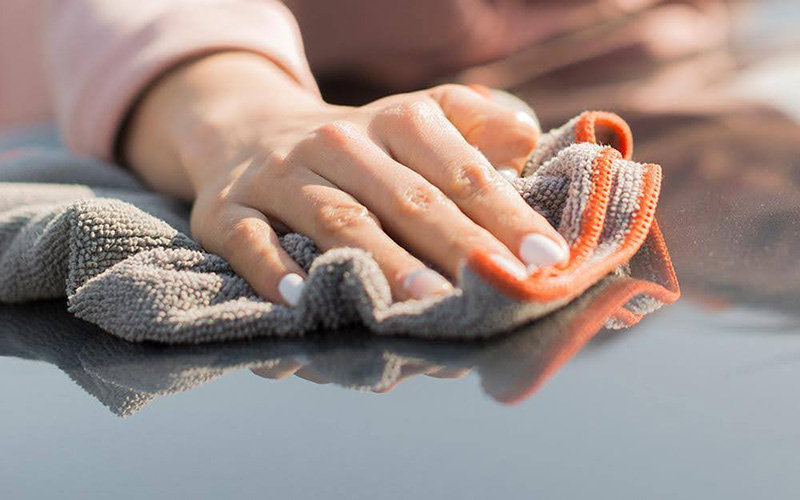
Microfiber towels are made from thin and light synthetic fibers. The most popular microfibers are made from a blend of polyester and nylon. A single microfiber is less than 10 μm (micrometers) thick. In comparison, the thickness of a cotton fiber can go up to 20 μm, and a human hair has a thickness of 50-120 μm.
Thin microfibers result in smaller and more compact towels that are easy to fold. Still, microfibers absorb just as much water as a cotton towel and take up less space on your shelf.
Smaller fibers also mean that there is more space for water absorption. Hence, microfiber fabrics are incredibly absorbent. Making them ideal towel materials for cleaning and sportswear.
Microfiber towels have a tighter weave of polyester yarn, which acts as a barrier for allergens, resulting in a more hypoallergenic and safe towel. However, individuals with a polyester allergy should avoid microfiber towels.
So, microfiber bath towels are lighter, longer-lasting, and have better moisture absorption than cotton bath towels. Their only downside is maintenance. High heat, rough use, and harsh detergents can quickly destroy the polyester fibers.
Most manufacturers recommend that you use gentle wash cycles and air-dry your microfiber towels.
Applications
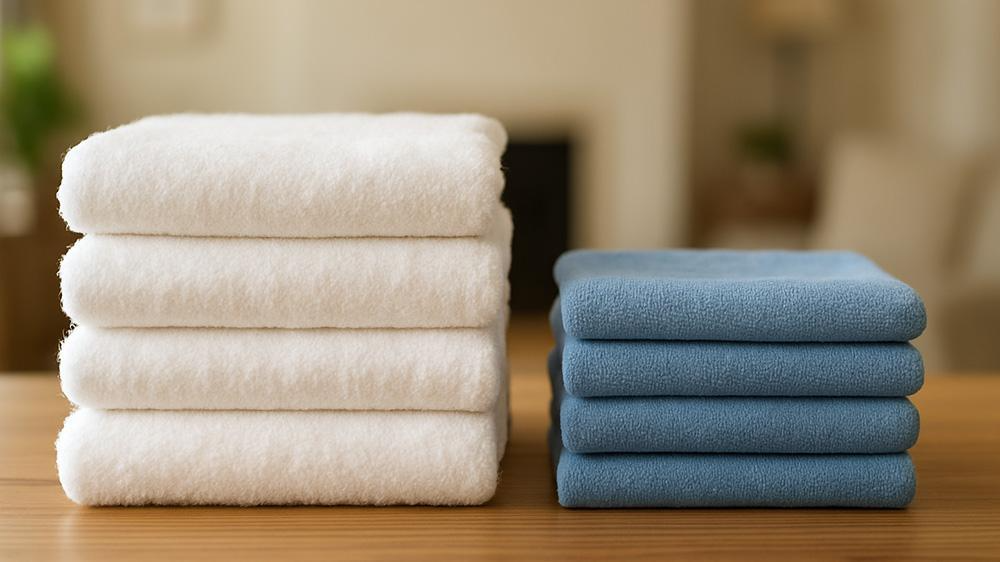
One of the biggest benefits of microfiber towels is that they don’t shed or leave behind lint. Making them an excellent tool for cleaning windows and screens.
Microfibers excel at car washing and drying. Tiny dust particles are more likely to get stuck to your cotton towel. These particles later cause scratches when drying your car. Similarly, cotton towels don’t absorb all the liquid, leaving water stains behind.
Luckily, microfiber towels solve both issues. Smaller strands mean dust doesn’t get stuck between the fibers. And high absorption means no excess water stays on the car surface.
Other applications of microfiber towels include the following.
- Facial Care
- Hair Care (Reduces Fizz)
- Kitchen Clean Up
- Lightweight Gym Towels
- Cleaning Sensitive Electronics (Camera Lenses, Phone Screens, etc.)
Advantages
Microfiber towels offer unique benefits to cleaning and drying applications.
- Superior Absorbency
- Lightweight and Easy to Store
- Quick Drying
- Resistant to Bacteria
- Ideal for Sensitive Electronics
- Excellent for Car Washing
Disadvantages
- Synthetic Fibers are Less Skin Friendly
- High Maintenance Requirements
- Higher Upfront Cost
- Synthetic Materials cause Microplastic Pollution
Water Absorption: Dispelling Common Myths
Are microfiber cloths actually as absorbent as everyone claims? The simple answer is yes. But it depends on the thickness and size of the microfiber cloth.
Microfiber Towel is More Absorbent by Weight
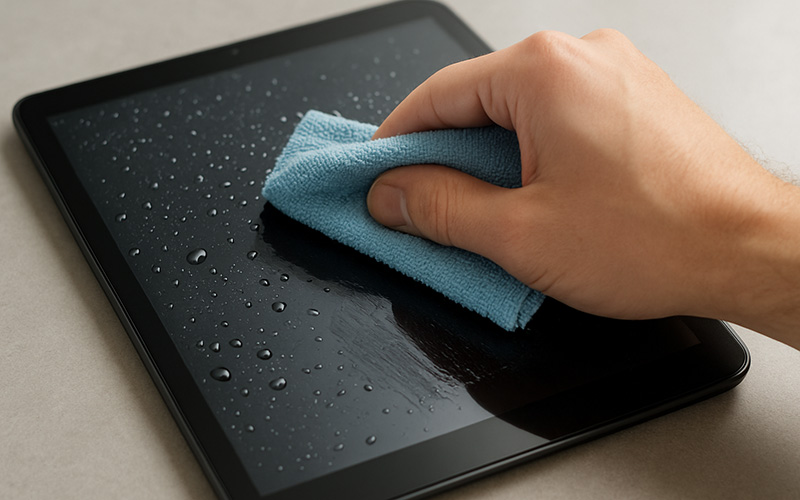
Gram for gram, a microfiber towel is more absorbent than a cotton one. The quality of a microfiber towel is measured in GSM (grams per square meter). A higher GSM towel will be heavier and absorb moisture more efficiently.
An easy way to check the quality of your microfiber towels is to hold them up to a light source. If the towel is translucent, it has a low GSM. Lower-quality microfiber towels are less absorbent than cotton ones. So always double-check that you’re buying the right type of towel for your house or business.
Microfiber towels are great at cleaning eyewear, phone screens, and dusting. Since water absorption isn’t a significant concern in these applications, you can opt for a lower GSM towel.
Cotton is More Absorbent by Price
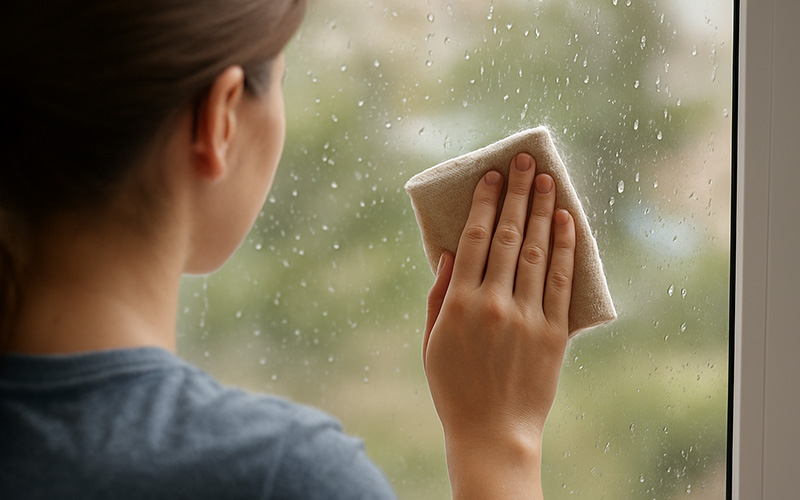
Although you may not realize it, price plays a very important role in water absorption. Microfiber towels are more expensive than cotton towels.
Many retailers sell microfiber and cotton towels at a similar price. However, there is a catch. Microfiber towels are usually half the size of cotton towels. So, if you buy a smaller microfiber towel, of course, it will be less absorbent than a same-priced large cotton towel.
We compared two large towels (30×60 in.), one made from microfibers and the other from pure cotton. The results? Microfiber towels have excellent absorbency and dry quickly. But the average price of microfiber towels is 30-55% higher than a cotton towel.
Here are five factors that contribute to a towel’s price.
- Size
- GSM
- Weave
- Brand
Head-to-Head Comparison of Cotton vs Microfiber Towels
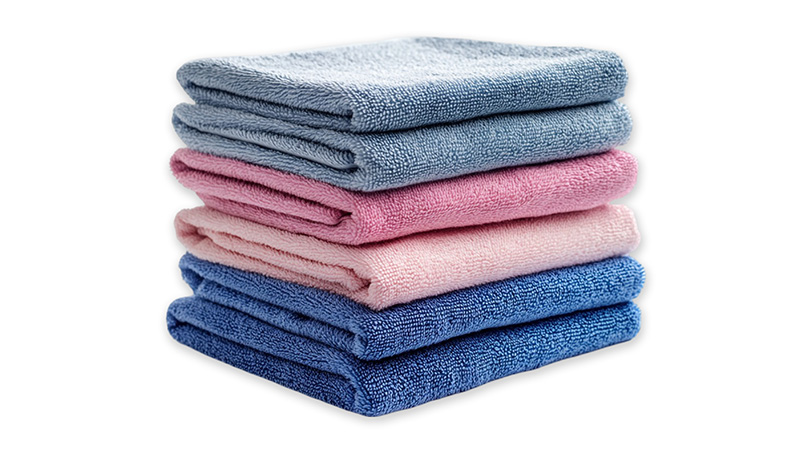
Water absorbency and pricing are two very important elements of a towel. But they aren’t the only factors to consider. At the end of the day, consumers should choose towels based on their home or needs.
1. Durability and Longevity
The durability and longevity of a towel depend on its application. Body towels are often washed twice a week to ensure cleanliness. Under good conditions, cotton and microfiber towels can last up to five years.
For cleaning applications, where repeated use is common, it’s a different story. Microfiber towels start to degrade after 300 wash cycles, which is ~1-2 years of use. Unlike microfiber towels, cotton towels have no wash cycle limit and can last much longer.
2. Skin & Hair Care
100% cotton towels are generally considered the gold standard for skin care. They are soft, natural, and non-reactive. Although cotton towels can hide germs and bacteria. Hence, they need extra care during washing.
Microfiber towels are bacteria-resistant, so they are great for facial care. Still, individuals allergic to synthetic fabrics should stick with cotton.
Both towels do a great job of drying your hair. However, cotton hair towels can cause your hair to frizz up from static accumulation.

3. Hygiene & Cleanliness
Bacteria can get attached to the loose threads in cotton bath towels. Even the best cotton towel becomes a hub for bacterial growth without proper care and regular washing.
In stark contrast to cotton bath towels, microfiber towels are more bacteria-resistant. For dusting applications, you can get away with just a quick rinse under cold water. But for face or body care, we recommend a good wash and a low heat dryer cycle.
Using the same towel for your face and body increases the risk of cross-contamination. Similarly, if many people share a towel, hygiene issues can arise. We recommend that consumers keep one towel for facial use and another for body care.
Microfiber towels dry quickly, so there is less time for bacterial growth, making it a better option for some applications.
4. Windows & Screens
Cotton towels are more likely to leave behind lint and loose fibers. This results in your windows and screens looking messy. Microfiber towels are specifically designed to be effective cleaning tools.
Digital screens, in particular, are very easy to scratch and scuff up. Dust particles get caught up in cotton towel fibers. Later, these dust particles will cause noticeable scratches.
Another big benefit of microfibers is their absorbency. A good microfiber cloth or towel will absorb the most amount of liquid on a screen. More water absorption means less risk of water stains.
5. Maintenance & Upkeep
Cotton towels have minimal upkeep. They are washing machine and tumble dryer compatible, making maintenance a breeze.
Contrarily, microfiber towels need more care. You have to use warm water and the gentle wash cycle on your washing machines, which takes longer. Additionally, you must avoid harsh detergents, fabric softeners, and tumble drying.
Most manufacturers recommend that you hang dry your microfiber towels. But microfiber cloths are quick drying, so that shouldn’t be a problem.
6. Environmental & Financial Costs
Microfiber towels are highly absorbent, but that advantage comes with a bigger price tag. Traditional towels are still the go-to choice for luxury hotels and resorts for their plush feel and affordable pricing.
Cotton towels can also withstand repeated rough use and a harsh wash cycle. In contrast, microfiber towels require more expensive washing practices.
From an environmental perspective, microfiber towels lose again to cotton towels. Natural fibers are considerably more environmentally friendly than any synthetic polymer.
Bamboo towels are another alternative that has popped up in recent years. They offer a similar softness, durability, and moisture absorption rate to cotton. Another benefit of using bamboo is that it’s a less resource-intensive plant than cotton.
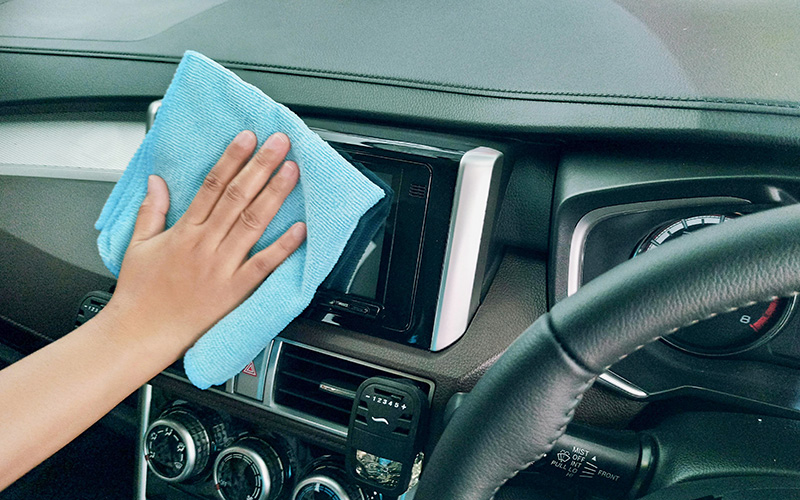
Table 1 – Comparing the Different Properties of Microfiber and Cotton Towels
| Properties | Microfiber Towels | Cotton Towels |
|---|---|---|
| Water Absorption | High | Medium |
| Skin Safety | Good | Excellent |
| Hygiene | Excellent | Good |
| Longevity | Decent | Excellent |
| Maintenance | High | Low |
| Sizes | Available in XS, S, M, L | Available in S, M, L, XL |
| Cost | High | Low |
Conclusion
Now you know everything about cotton and microfiber towels. So, it’s time to choose the right one for yourself. Cotton towels offer natural fibers, skin-friendliness, and everyday comfort at affordability prices. Microfiber towels are exactly the opposite. They are fast-drying, portable, and lint-free. Making them ideal for sports, travel, and cleaning applications.
The best towel is one that suits your particular applications and personal preference. Use this guide to choose the right option for your home, business, or personal care routine.
Get High-Quality Microfiber & Cotton Towels from Manywell!
Manywell is a titan of the cleaning product industry. We specialize in high-quality fabric-based cleaning products for home and professional use. We use 100% premium cotton for our cotton towels and offer several varieties of microfiber towels.
We have satisfied customers in over 70 countries worldwide. Choose a towel brand that thousands of businesses trust and respect.
Get customized quotes tailored to your needs. Contact us now!



